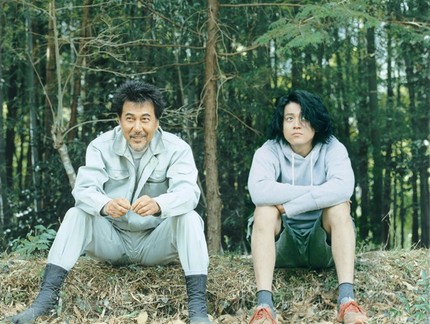Japan Cuts 2012 Review: THE WOODSMAN AND THE RAIN

The major highlight of this year's Japan Cuts festival for Japanese film fans, as well as fans of great acting in general, is the New York appearance of Koji Yakusho, one of Japan's most acclaimed and accomplished actors, who continues to work at the top of his form. The Eel, Cure (screening July 21), Eureka, Warm Water Under a Red Bridge, and Doppelganger are but a few of the more memorable films he has starred in. Japan Cuts this year will feature a career mini-retrospective devoted to Yakusho, which will include Shall We Dance?, Masayuki Suo's 1996 film that was many Westerners' introduction to Yakusho, as well as Takashi Miike's remake of 13 Assassins (which Yakusho will introduce on July 21), and his 2009 directorial debut Toad's Oil.
One of Yakusho's more recent films that will screen at the festival is this year's centerpiece presentation, Shuichi Okita's singularly odd comedy The Woodsman and the Rain, which contains a typically emotionally nuanced and quietly masterful performance from Yakusho. The film will screen July 20, 7pm at Japan Society, with an introduction and Q&A with Yakusho, who will receive the festival's "CUT ABOVE Award for Excellence in Film."
In The Woodsman and the Rain, Yakusho plays Katsu, a 60-year-old lumberjack laboring away in the Nakatsugawa forest in rural Japan, where he makes his living and leads a peaceful life in the nearby village. His main conflict is with his aimless, slacker son (Kengo Kora), whom he frequently berates for always quitting jobs and never sticking to anything. As the film opens, it is close to the second anniversary of the death of his wife, whom he dutifully makes homage to each day before he goes to work.
Katsu's contented routine is interrupted one day when a film production assistant (Kanji Furutachi), after narrowly escaping being struck by a felled tree, asks Katsu to stop using his chainsaw, since the noise is interrupting a nearby film shoot. Katsu complies with this request, and soon after he encounters the PA again, giving him a ride when the PA's car is stalled on the road. This time, the PA is accompanied by a meek, diffident young man named Koichi (Shun Oguri). Katsu is initially impatient with Koichi for not doing enough to help his older colleague, seeing in Koichi an echo of his son.
The film being shot in the village and surrounding forest is a low-budget zombie movie, and besides helping to scout locations, Katsu, in a very funny scene, is drafted to play a zombie extra. He is forced to go home in his zombie makeup when the makeup artist is unavailable after the day's shooting. Katsu attends the screening of the dailies for the crew, and though he is embarrassed by seeing himself on screen, he begins to take quite a liking for the filmmaking process, and enjoys the impressed reactions of his friends when he describes his experience as an amateur actor. Katsu also takes a liking to Koichi, who as it turns out is not the lowly assistant he at first appears to be, but is actually the film's screenwriter and director. Koichi, however, is severely lacking in confidence, feeling that he's in over his head on his first film, dealing with temperamental actors and a surly cinematographer whose constant refrain before each take is "Are we gonna do this or not?" However, Katsu's encouragement and enthusiasm allows Koichi to gain the strength to fully believe in his own vision. Their relationship, which grows to be a surrogate father-son one, is mutually beneficial; Katsu discovers hidden sides of himself through his work on the film. And indeed, Katsu proves to be a valuable asset to the crew, enlisting many of the villagers to be part of a zombie-fighting army in the film, as well as being zombie extras, which occasions a great sight gag with the villagers going about their daily tasks and activities wearing zombie makeup. Also, Katsu's ability to accurately predict the arrival and departure of rain comes in very handy on the final day of the shoot.
The Woodsman and the Rain, with a running time of over two hours, has a rambling, discursive quality and episodic structure that may seem to be too lengthy to sustain its premise, but in the confident hands of Okita and his co-screenwriter Fumio Moriya (Underwater Love), this proves to be much more of an asset than a liability. The grounded, unforced naturalism of the film's style, enhanced by the rustic beauty of its setting, as well as the believable sense of rapport in the interactions between the characters, lends the film a genial charm that becomes quite infectious. Koji Yakusho, as we have come to expect, gives his character a fully lived-in quality, and a gravity and multi-faceted approach to conveying a complete human life that seems effortless and is a beauty to watch. He interacts beautifully with all his co-stars, especially with the younger Oguri; old-school classicism and new-school indie sensibility combine in a riveting and satisfying fashion.
The July 20 screening of The Woodsman and the Rain is currently sold out, but there may be standby tickets available. For more information on this and other Japan Cuts selections, visit Japan Society's website.
The Woodsman and the Rain
Director(s)
- Shûichi Okita
Writer(s)
- Shûichi Okita (based on the novel by)
- Fumio Moriya (screenplay)
- Shûichi Okita (screenplay)
Cast
- Kôji Yakusho
- Shun Oguri
- Tsutomu Yamazaki
- Kengo Kôra

Do you feel this content is inappropriate or infringes upon your rights? Click here to report it, or see our DMCA policy.






